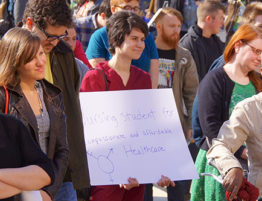
As our society hurdles deeper into the age of an Orwellian surveillance state, it is becoming apparent that some tech companies are taking initiative in pumping the brakes.
During a Stanford event on “human-centered artificial intelligence”, Microsoft President Brad Smith announced that the company had turned down a request from a California law enforcement agency that wanted to use their facial recognition technology. The intention of the agency was to deploy this recognition ability in their body cameras and vehicles.
Smith stated that “anytime they pulled anyone over, they wanted to run a face scan…we said this technology is not your answer.” He did not name the agency who put in the request.
During the same speech he said that Microsoft chose not to sell them this technology due to the disproportionate affect they felt it could have on minorities and women. Apparently, since the technology is primarily trained using white male faces it therefore is at a higher risk of misidentifying females and variable complexions.
Although in this instance Microsoft decided not to participate in the realm of law enforcement facial recognition, they have in the past chosen to do so. Smith noted that there is an American prison which they sold the technology to, only after concluding a limited scope and overall improvement of safety.
The debate over this technology is a boiling point for some activists, who point to the dystopian extent to which China uses it. Earlier this week, The New York Times reported that this technology is being used to track Uighurs, a Muslim minority in the country. By doing so, they can monitor when, where and with whom members of this group move within cities. Moreover, it will raise red flag warnings when they are found to be congregating in suspicious numbers.
The revelations of this reporting are compounded atop the highly controversial ‘social credit’ system recently established in China, through which people are penalized and rewarded by practical means for their behavior. An example is that a person who is found to infract upon rules (for instance, playing music loudly in public or spreading religion), could be penalized by losing their rights to purchase plane or train tickets. On the other hand, people with high social credit scores may be granted perks such as better rates on loans.
Although advocates of surveillance programs often fall back onto the argument that ‘if you have nothing to hide, then you have nothing to be afraid of’, many in opposition are not necessarily fighting against a particular facet of the system, but rather the idea of the system itself.
If law enforcement was to begin deploying facial recognition technology across their fleet of vehicles and body cameras, how far down the road will it be before we use that precedent as an argument for installing the technology in all municipal cameras? It is of some consolation that there are companies willing to slow this process, but there is no doubt that it will continue with or without the cooperation of the private sector.
John Rosenbaum is an Orange County Personal Injury and Worker’s Compensation attorney that has been faithfully serving southern California for decades. If you might be in need of representation, contact our offices today for a free, no obligation consultation.





Write a comment: